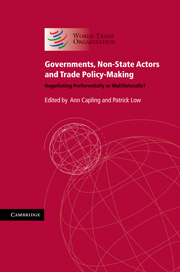Book contents
- Frontmatter
- Contents
- List of figures and tables
- List of contributors
- Acknowledgements
- Disclaimer
- Introduction
- 1 The domestic politics of trade policy-making: state and non-state actor interactions and forum choice
- 2 Chile
- 3 Colombia
- 4 Mexico
- 5 Indonesia
- 6 Thailand
- 7 Jordan
- 8 Kenya
- 9 South Africa
- 10 The influence of international non-state actors in multilateral and preferential trade agreements: a question of forum shopping?
- 11 Main findings and conclusions
- Index
- References
3 - Colombia
Published online by Cambridge University Press: 05 July 2014
- Frontmatter
- Contents
- List of figures and tables
- List of contributors
- Acknowledgements
- Disclaimer
- Introduction
- 1 The domestic politics of trade policy-making: state and non-state actor interactions and forum choice
- 2 Chile
- 3 Colombia
- 4 Mexico
- 5 Indonesia
- 6 Thailand
- 7 Jordan
- 8 Kenya
- 9 South Africa
- 10 The influence of international non-state actors in multilateral and preferential trade agreements: a question of forum shopping?
- 11 Main findings and conclusions
- Index
- References
Summary
It is usual for both governments and organizations from the private and civil society sector of developing countries to dedicate more time and resources to bilateral and regional negotiations than to multilateral negotiations. In principle, this contradicts the classic theory of trade in which the greatest welfare gains are to be found in the multilateral field and in which preferential trade agreements (PTAs) can lead to trade diversion and welfare losses.
In popular defence of PTAs, it is pointed out that multilateral negotiations are slow, uncertain and, given the veto power of members of the WTO, it is very difficult to obtain the required consensus, in contrast to bilateral negotiations where there is greater control of the negotiating agenda, process and timeframe. Hence, developing countries confront situations typical of the ‘prisoners’ dilemma’ when they decide to carry out bilateral or regional negotiations and simultaneously carry on with multilateral negotiations.
In this chapter, based largely on interviews with government officials, business association managers and civil society organizations (CSOs), the intention is to interrogate this hypothesis. Furthermore, the attitudes and strategies of different types of non-state actors (NSAs) are scrutinized in relation to the question of forum choice – preferential or multilateral – in order to determine whether there are underlying explanations that could explain their preferences; for instance, in relation to their particular interests or to their winning or losing position in specific negotiations.
- Type
- Chapter
- Information
- Governments, Non-State Actors and Trade Policy-MakingNegotiating Preferentially or Multilaterally?, pp. 63 - 88Publisher: Cambridge University PressPrint publication year: 2010
References
- 1
- Cited by



